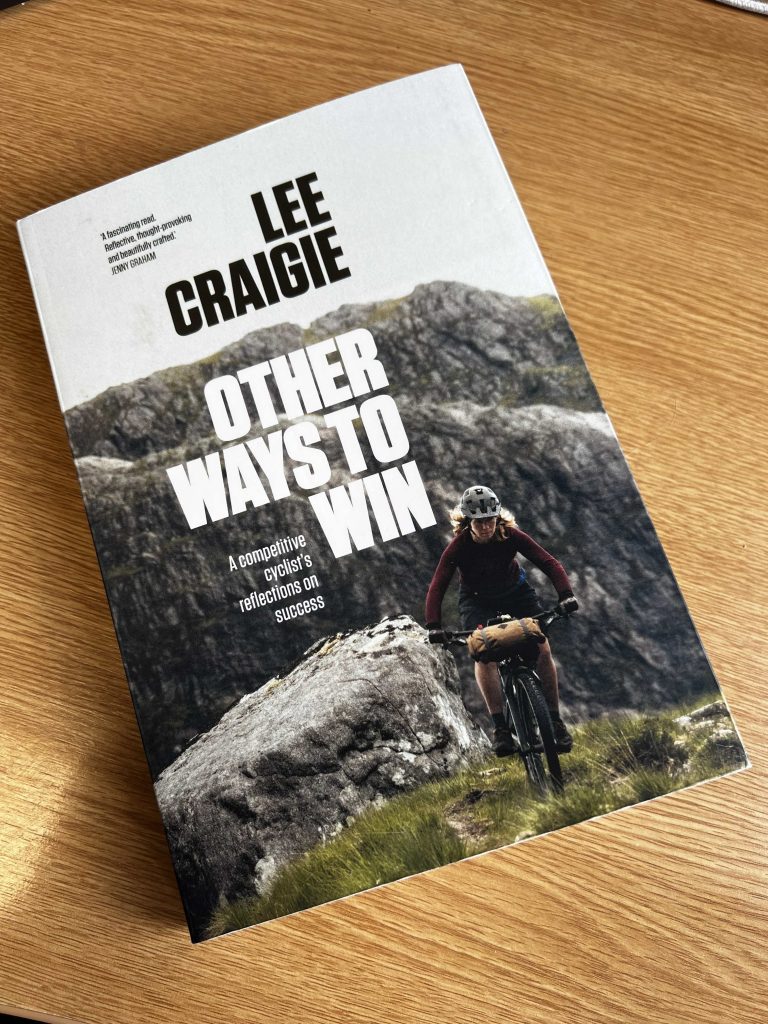“My task was to write an autobiographical account .. whose strapline in “Inspiring Adventure ..So I wrote this book for myself in the same spirit as I hope each individual who picks it up interprets it, with their own bias and background”
Lee Craigie will be a name familiar to many of us within the bikepacking community. A veteran of many of the classic ultra-endurance events and trails, The Tour Divide, Highland Trail 550 and the Colorado Trail to name a select few. In addition Lee has been an outstanding ambassador for female cyclists via her work with the Adventure Syndicate and her personal endeavours to encourage and facilitate female participation in cycling/ultra endurance racing.

“Other Ways to Win”, published by Vertebrate Publishing, offers us a window into the full spectrum of Lee’s career from competitive cyclist to advocate. The title is cleverly chosen and the narrative within the book expands this further.
Lee’s story begins with her childhood, setting the scene for following chapters. Lee describes an upbringin that many will have experienced, a loving family, a reasonable standard of living and a stable environment. But with this came “societal expectation” and Lee found herself confronting and questioning this. Clearly she was destined to follow another path and as we all know bicycles are a great way to begin that journey. Lee quickly found companionship, a sense of belonging and a path to achievement in cycling.
“The ride goes on forever. I am white hot and desperate for it to be over, but I will not ask for help, I will not panic, I will not cry”
It didn’t take long to establish her talent and I found the subsequent chapters describing her growth into cycle racing fascinating. Lee’s current identity is very much around her endurance riding credentials and I had not realised the achievements that these are based on. She quickly rose up the ranks to become British Mountain Bike Champion and then go on to represent her country at international events. Lee rightly outlines her frustration with the path she had to take to become champion. She didn’t quite fit the mould, training her own way and speaking her mind when asked. This struggle clearly formed Lee further and it’s no surprise to the reader that she leaves the path of elite level racing to find “other ways to win” elsewhere.
This then forms the remainder of the book. Lee describes her work forming and nurturing the Adventure Syndicate, a collective of women with the express aim of showing just what can be done by a group of committed female riders bound together by a common will. I particularly enjoyed the gripping account of their first challenge, an assault on Mark Beaumont’s North Coast 500 record. Crashes, vomiting, a potential mutiny and a typically impossible final hour. The ride had me on the edge of my virtual seat. I’ll let you read the book to find out whether or not they achieved the record.
“Our North Coast 500 team time trial record attempt was the start of The Adventure Syndicate’s mission to rewrite the Hero’s Journey Narrative…. They involve awe and admiration while also maintaining a distance between protagonist and audience”
Lee goes on to account many other challenges in the following chapters, a ride across the Pyrenees, a set of chapters detailing participation within the Tour Divide and a final chapter dedicated to the Highland Trail 550, a race that cleary stuck with Lee as she goes on to credit Alan Goldsmith the organiser in the book’s acknowledgements.
Each challenge comes with Lee’s own personal thoughts and insights. She describes the wax and wane of her own relationships whilst exploring wider themes such as drive, motivation and societal pressures. Each chapter stands alone as a piece of writing with their order in the book designed to exhibit how Lee continues to win (or not) whilst following the path of less convention.
“The humble bicycle and the spirit of the human being. Together it transpires, we can perform miracles”
The book ends somewhat abruptly with the chapter covering the Highland Trail race. This was my only disappointment as I felt her story to date would have benefitted from summation. What had she learned? Where was she now? and What is she planning next? I suspect the abrupt ending is symptomatic of the fact that we’ve got a lot more to hear from Lee and she’s probably out there doing it right now.
However, this doesn’t detract from the fact that “Other Ways to Win” is an absorbing read giving us a real insight into the driving forces behind the whirlwind that is Lee Craigie. Her writing style is accessible, thoughtful, honest and non-judgemental. At the end of the book I felt that I’d got to know Lee on a personal level via a growing friendship curated by each chapter. This book will sit well with any reader looking to expand their cycling horizons or seek new inspiration.
A very big thank you to Dave ‘sweary’ Barter for penning this installment of ‘book club’ and if it’s made you think you’d like your own copy, then you can buy one directly from the nice people at Vertebrate
